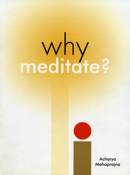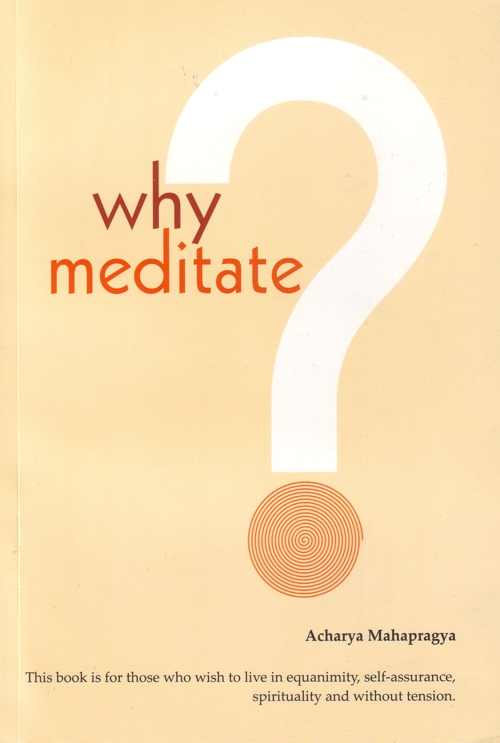
 Many stages of mind have been described. Amongst them are Vikshipt Avastha - the state of turmoil, Mudha Avastha � the state of infatuation, Yatayat Avastha � the state of wavering, etc. Acharya Hemchandra has very beautifully described these. In his book Manonushasanam Acharya Tulsi has vividly described these states of mind. We should read all this literature to clarify our knowledge about these states of mind. When the mind is in turmoil, it reaches the state of madness. The particles of deluding karmas Mohaniya Karma excite the world of emotions. These emotions, in turn, affect the mind and the mind starts wandering. Why does the mind wander? Emotions are affected by the particles of Mohaniya Karma, the mind gets affected by emotions and it reaches a perplexed or crazy state many times over. For a person practicing spirituality it is necessary to keep out of the maze of deluding karmas. If one tries to come out of the maze of Mohaniya Karma, and attempts to extricate oneself from it, then the turbulence will recede. The subjects of the senses in the outer world infatuate the mind and produce like or dislike, according to the respective circumstances.
Many stages of mind have been described. Amongst them are Vikshipt Avastha - the state of turmoil, Mudha Avastha � the state of infatuation, Yatayat Avastha � the state of wavering, etc. Acharya Hemchandra has very beautifully described these. In his book Manonushasanam Acharya Tulsi has vividly described these states of mind. We should read all this literature to clarify our knowledge about these states of mind. When the mind is in turmoil, it reaches the state of madness. The particles of deluding karmas Mohaniya Karma excite the world of emotions. These emotions, in turn, affect the mind and the mind starts wandering. Why does the mind wander? Emotions are affected by the particles of Mohaniya Karma, the mind gets affected by emotions and it reaches a perplexed or crazy state many times over. For a person practicing spirituality it is necessary to keep out of the maze of deluding karmas. If one tries to come out of the maze of Mohaniya Karma, and attempts to extricate oneself from it, then the turbulence will recede. The subjects of the senses in the outer world infatuate the mind and produce like or dislike, according to the respective circumstances.
It should be noticed that meditation is not only good. This knowledge is a great contribution of Jain spiritual practice. There are two kinds of meditations:
- Arta-Raudra Dhyan
- Dharma-Sukla Dhyan
Arta-Raudra Dhyan is a kind of meditation and concentration, but it does not lead to emancipation. Hence, it is not considered to be good. Dharma-Sukla Dhyan is beneficial and leads us to spiritual upliftment. Arta Dhyan occurs in the loss of loved ones and gain of disliked ones. The concentration at the time of the loss of loved ones (i.e. in the form of crying, weeping, remembering, etc.) is Arta Dhyan. The meditation of the crane is very significant. The crane preys on fish by standing on one leg. It is so stable that is taken as an illustration of Ekagrata (concentration). What exemplifies concentration? The crane. Why is that concentration considered bad? Because its motive is not good. Its concentration is just for the sake of preying on fish. Hence, we should not consider mere concentration to be good, but also take into consideration the motive. This is a test - if the motive is good, concentration for the same is good. If not, then that concentration is bad.
The concentration upon the loss of loved ones or cherished things is very intense. But such concentration leads to Arta Dhyan and becomes the cause of illness. A great Acharya of Ayurveda, Charak wrote �Ishtalabhat Anishtalabhat Manaso Rogah" meaning: there are two causes of mental illness:
- Loss of loved ones, or not getting a desired thing
- Gain of the disliked.
Comparing these two reasons, described by Charak, with the Aagamas, we find that Arta Dhyan is the principal cause of mental illness. The loss of a loved object or the death of a beloved person makes a man engrossed in Arta Dhyan. Similarly, on meeting a disliked person (be it a disliked servant, colleague or partner), the state of our mind becomes strange and fragile.
Meditation can produce as well as destroy diseases. Arta Dhyan leads to bad health while Dharma Dhyan leads to good health. In presence of Arta Dhyan there will be a kind of uneasiness and frustration would give rise to illness.
How to deal with the illness and suffering is an art. If we meet our difficulties with equanimity, then our karmas will fall off and new illnesses will not arise. If, however, we cry in the face of suffering, then we are inviting new diseases as well as disharmony.
Acharya Kundkund has beautifully analysed the art of facing our karmas. How should we take the consequences of our karma (acts)? How should our consciousness be while going through the fruition of our karmas? One who learns this art acquires the mantra of good mental health. The art of facing karmas is equanimity. Jayacharya was a prudent scholar of Aagama literature. He has written a great treatise titled Aradhana. This work is heard when one is at the end of one's life. The soul of the dying would be greatly benefited and blessed on hearing it. It is worship to purify the dying soul. In this work, he has written that when dealing with difficulty we should think like Jinkalpi Muni (a special kind of ascetic) and tolerate each and every difficulty encountered. Then why should I be intolerant of a slight pain in my body? I will calmly accept it. Tolerating with equanimity is the art of facing difficulty. The person who does not know how to be equanimous during the time of difficulty/suffering attracts new bondages of karma and also suffers more.
A person was suffering from acute cancer. Acharya Tulsi once went to bless him.
He asked the man: "How much are you suffering?"
The man answered: "I am not suffering at all."
Acharya Tulsi enquired, "How is that? Cancer is, after all, very painful.
He replied, "Whenever I feel pain, I play the cassette of your songs and as I listen to them, no pain is left."
This is progress in meditation. In painful periods if you direct all your concentration on that pain, then you will indulge in Arta Dhyan. If we re-channelise our concentration from pain to another subject, the pain left is less and, further, we would be saved from bondages of new karmas. This is the art of facing suffering. If man can learn the art of facing disease, then he can be free of it.
In one camp of Preksha Meditation I had exhorted all to make friends with old age, disease and death. If you develop friendship with all of them, they wouldn't bother you. If you hate them, then old age will harass you. So making friends with disease will allow a compromise with it by your saying, �If you don't bother me, I won't bother you either.� Acharya Tulsi was suffering from a respiratory disorder. Even after the advent of this affliction, he lived for almost 40-50 years more, but never felt much pain. Acharyashri said, "We have signed an agreement that neither will I worry you nor will you harass me." That is why the suffering was less. Only sometimes would he suffer. If you develop a friendship with your pains, then you will be performing Dharma Dhyan. If you lose patience, then the disease will harass you more and give more pain. �Do not panic in pains.� This is a very important principle to keep away from mental illness.
Arta Dhyan is the principal cause of mental illness. Dharma Dhyan is a very good tool for curing mental illness. So practice Dharma Dhyan. Concentrate to know the Ultimate Truth.
The inner causes of mental illness are lust, anger, fear, etc. These are described in Aagamic and Ayurvedic literature. Even in medical science this fact has been described. Lust, anger and fear are emotions. With an increase in their intensity, mental illness is produced. The common man has the feeling of lust in him but if this feeling is present to an abnormally high degree, then he will be prone to mental illness. Similarly, excess of anger may cause mental ill health. Our brain is arranged in such a manner as to allow for two types of systems. Working hand in hand with each other are one system that excites and another which pacifies. Both these systems are recognised by psychology as well as neuroscience. There is a zone of agitation as well as of forgiveness in our brain. The zone of forgiveness commands the zone of agitation not to get over�excited. If not controlled thus, God knows what kind of catastrophe would befall man! Excess of anger would make a man fall sick physically and mentally.
On loss of loved ones, man would become unhappy. Excess unhappiness can drive a man to mental disturbance. As explained in Ayurveda unbounded lust, unhappiness and fear distort the flow of air into the body and give rise to illness.
Similarly, emotions should not be excessive. Controlling of passions is a very important part of Preksha Meditation. Control your emotions/passions. Feeling good during meditation should not be the only result of meditation. The true outcome of Preksha Meditation is gaining the power to control our emotions/passions.
The parameters for judging the effect of meditation are, firstly, the degree of change in our own behaviour. Limiting oneself to gaining peace and stopping there may be deceiving our meditation. The experienced practitioner of meditation must think, "How much change has meditation wrought in my behaviour?" If there is no change, then we should understand that our practice is not correct and thus is not yielding fruit.
The second parameter is - control of emotions/passions. One should ask oneself: "Have I been able to control my emotions/passions or not?" If not, then our practice has not yet yielded fruit, and if the control is gained then we are marching forward towards our destination.
To analyse meditation on the basis of the mental state, to decide its measure is introspection of self-analysis. In these two lines, everything will become clear: reduction in Arta-Raudra Dhyan will lead to good mental health. Increment in Dharma-Shukla Dhyan will lead to mental well being. With this touchstone, if the analysis of mental well being is done, we can understand and solve our mental problems by ourselves.
 Acharya Mahaprajna
Acharya Mahaprajna
 Copyright by Acharya Mahaprajna ©2005
Copyright by Acharya Mahaprajna ©2005